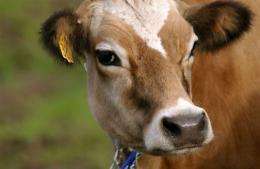Argentine lab clones cow to produce human-like milk

An Argentine laboratory announced that it had created the world's first transgenic cow, using human genes that will allow the animal to produce the equivalent of mothers' milk.
"The cloned cow, named Rosita ISA, is the first bovine born in the world that incorporates human genes that contain the proteins present in human milk," Argentina's National Institute of Agrobusiness Technology said in a statement on Thursday.
Rosita ISA was born on April 6 by Ceasarian because she weighed more than 45 kilos (99 pounds), about twice the normal weight of Jersey cows, according to the statement.
As an adult, "the cow will produce milk that is similar to humans," the statement said.
"Our goal was to raise the nutritional value of cows' milk by adding two human genes, the protein lactoferrin, which provides infants with anti-bacterial and anti-viral protection, and lysozyme, which is also an anti-bacterial agent," said researcher Adrian Mutto at a press conference.
The cloning was a joint effort between the Argentine institute and the country's National University of San Martin.
(c) 2011 AFP

















